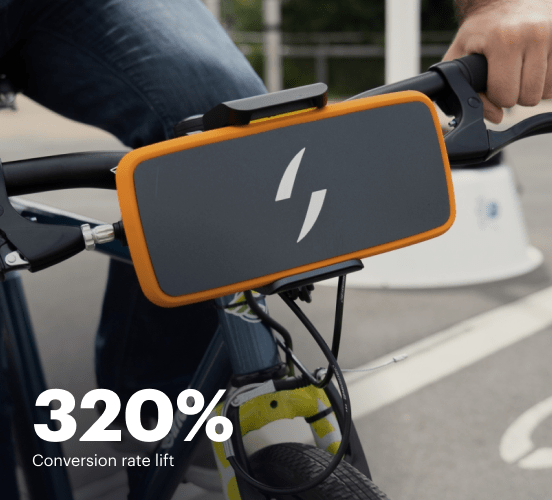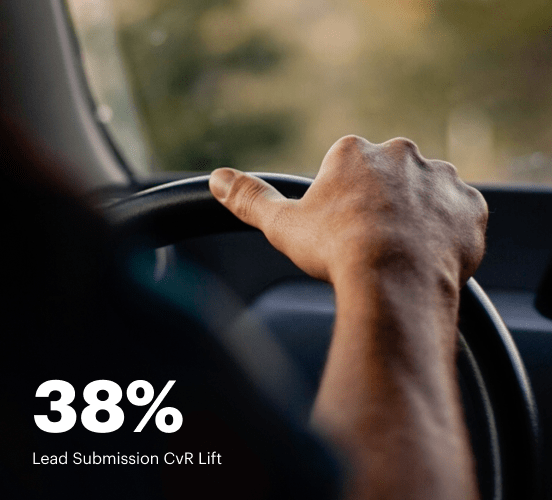Pardot vs. Webflow: the best platform for a seamless web experience
Discover how Pardot compares to Webflow regarding features and usability. Find out which platform provides the competitive advantage your business deserves.
Get startedSee how Instapage stacks up against the competition
| Feature | Instapage | Other builders |
| Drag-and-Drop Tools | ||
| Conversion-optimized templates | ||
| Manual and AI-powered A/B Tests | ||
| AI content suggestions | ||
| Popups and sticky bars | ||
| Canvas and grid blocks | ||
| Reusable and global elements | ||
| Form and popup builders | ||
| Built-in Heatmaps | ||
| Central analytics dashboard | ||
| Ad-to-page personalization and collections | ||
| Contacts, lists, and email | ||
| Dedicated, full-service CRO experts | ||
| Enterprise-ready platform |
Leading the way in building high-performing landing pages





Why Instapage is the smarter choice for your campaigns
Get everything you need to build, scale, and optimize high-converting landing pages—without coding.
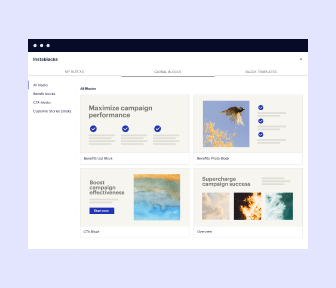
Easier page building without coding
Instapage offers a flexible and seamless page creation experience with a library of 500+ conversion-focused layouts, Instablocks®, a drag-and-drop builder, and AI content generation. With technologies like Thor Render Engine®, you can create on-brand, mobile-responsive landing pages that load quickly and start converting during initial visitor clicks.
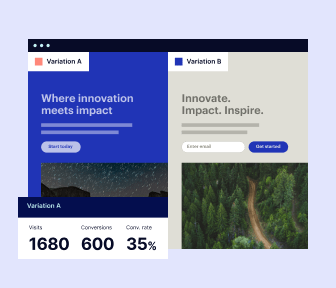
More insights — better results
Instapage lets you see in detail how each landing page experience and variation is performing so you can make targeted changes that boost page conversions. Use heatmaps for a better understanding of on-page activities, run A/B tests and AI-assisted experiments, and then track and evaluate results within robust analytics dashboards.
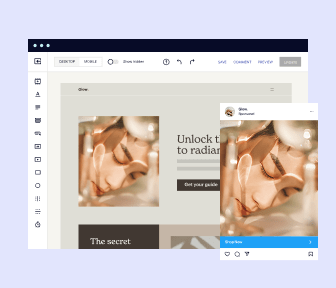
More personalized experiences
Instapage lets you quickly create high-performing landing pages tailored to each of your ad campaigns. Deliver personalized experiences for distinct audiences using dynamic text replacement. Effortlessly align specific advertisements to unique pages with AdMaps. Monitor audience-level metrics using our advanced data tools.
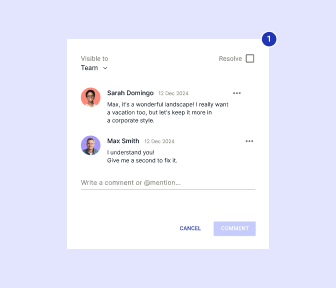
Built-in collaboration
Instapage collaboration capabilities bring your entire team together to speed up the process of landing page review, approval, and launch. No more frustrating and unnecessary revisions or edits scattered across emails. Provide instant feedback, conduct real-time page edits, and securely share your pages with outside stakeholders.
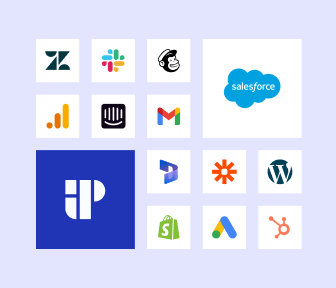
Free up time for your business
Invest time into business growth, not busy work. Launch landing pages faster with reusable forms and templates. Build once, reuse forever.
Explore all integrations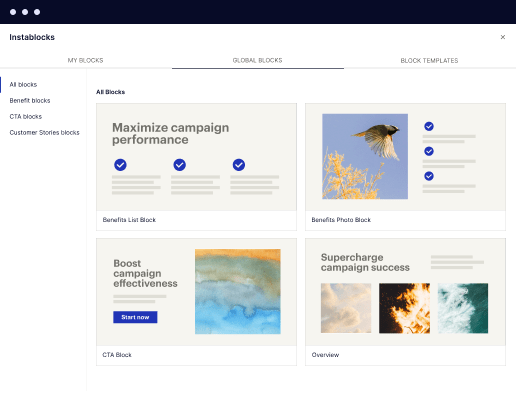
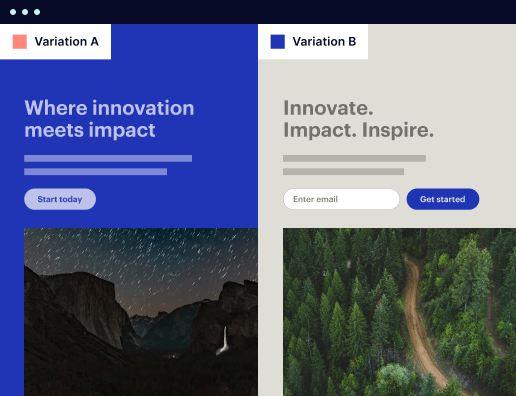
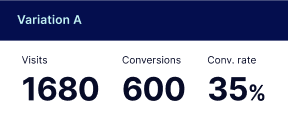
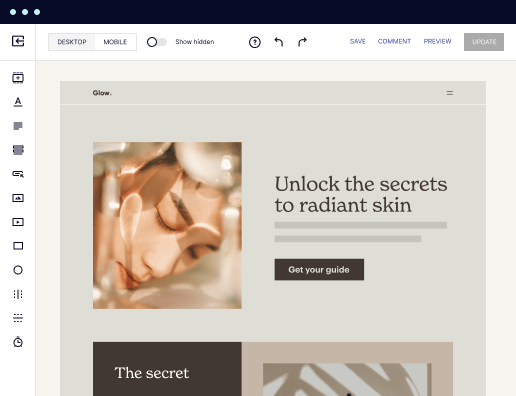

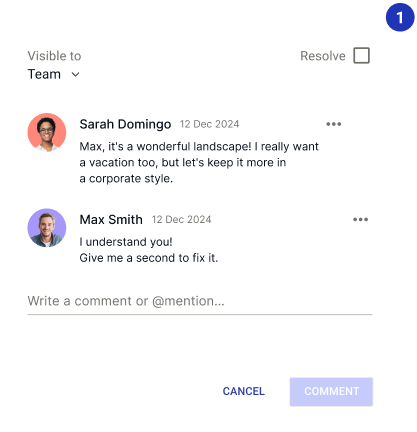
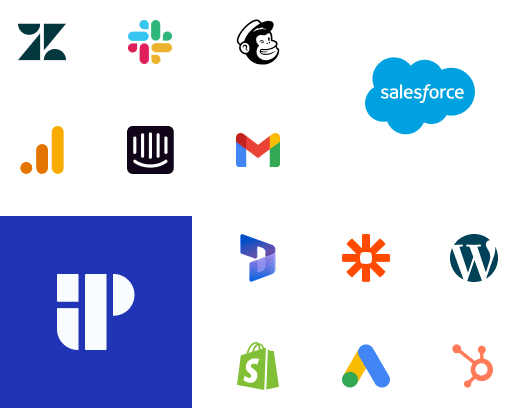
Easier page building without coding
Instapage offers a flexible and seamless page creation experience with a library of 500+ conversion-focused layouts, Instablocks®, a drag-and-drop builder, and AI content generation. With technologies like Thor Render Engine®, you can create on-brand, mobile-responsive landing pages that load quickly and start converting during initial visitor clicks.
More insights — better results
Instapage lets you see in detail how each landing page experience and variation is performing so you can make targeted changes that boost page conversions. Use heatmaps for a better understanding of on-page activities, run A/B tests and AI-assisted experiments, and then track and evaluate results within robust analytics dashboards.
More personalized experiences
Instapage lets you quickly create high-performing landing pages tailored to each of your ad campaigns. Deliver personalized experiences for distinct audiences using dynamic text replacement. Effortlessly align specific advertisements to unique pages with AdMaps. Monitor audience-level metrics using our advanced data tools.
Built-in collaboration
Instapage collaboration capabilities bring your entire team together to speed up the process of landing page review, approval, and launch. No more frustrating and unnecessary revisions or edits scattered across emails. Provide instant feedback, conduct real-time page edits, and securely share your pages with outside stakeholders.
Free up time for your business
Invest time into business growth, not busy work. Launch landing pages faster with reusable forms and templates. Build once, reuse forever.
Explore all integrationsGet started with Instapage in a few steps
-
Create your Instapage account
Start with Instapage by signing up via Google or your email. You'll get access to a free 14-day trial to discover Instapage capabilities. Feel free to cancel anytime during the 14-day trial if you decide that our product is not suitable for your business. -
Build and personalize your page
Create your first landing page from scratch or choose a template from 500+ customizable layouts. Use the drag-and-drop builder to add page elements, fonts, and backgrounds, refine content with AI, or add custom HTML, Javascript, and CSS. -
Review and make edits
Collaborate on page designs and streamline review processes. Invite your team members and stakeholders to review, edit, and provide feedback on your landing page. Collaborate knowing your page is confidential and only accessible to authorized users. -
Publish and track page performance
Publish your page to a domain or custom URL. Connect your pages to the ads you've created and track page performance within the analytics dashboard, run A/B tests and AI experiments, analyze results, and continuously optimize your landing page to maintain high conversions.
Pardot vs. Webflow: An In-Depth Comparison with a Surprising Contender
Navigating the digital marketing landscape does not have to feel overwhelming. Choosing the right advertising tools that suit your unique business needs can be a game-changer. Two heavyweights, Pardot and Webflow, may seem similar at a glance, but each brings its unique strengths to the table. In this article, we will break down the features, usability, performance, support, pricing strategies, and more for both platforms. We'll even throw in a surprise competitor, Instapage, that might just steal the show. Strap in as we embark on this informative journey through the world of digital marketing tools.
Meet the Titans of Digital Marketing
Pardot positions itself as a comprehensive marketing automation platform, crafted for B2B companies with a focus on nurturing leads and enhancing customer relationships. With robust analytics and automation features, Pardot caters primarily to businesses looking to maximize their return on investment. On the other hand, Webflow presents itself as a flexible website and landing page builder that emphasizes design and user experience. Their visual editor is particularly appealing, allowing users to build responsive sites without extensive coding knowledge. As we dive deeper, we’ll also introduce Instapage, a platform designed specifically for landing pages, which has also gained substantial traction for its unique offerings. Let’s set the stage for a head-to-head battle.
Feature Face-Off: Who Comes Out on Top?
When it comes to features, Pardot and Webflow each offer exciting capabilities. Pardot excels in lead management, offering tools like automation rules, lead scoring, and dynamic content tailored for target audiences. Meanwhile, Webflow shines with its design-focused features, providing users the flexibility to create stunning websites with a visual editor and CMS capabilities. However, Instapage is also lurking in the corner, ready to shine with its focus on creating high-converting landing pages. As we explore what each platform offers, you’ll find strong contenders at every level.
Usability Showdown: Catering to Every User
Getting to grips with a new platform can be a tall order. Pardot and Webflow both aim to simplify this task for their users. Pardot’s interface caters to marketing teams with varying levels of experience, featuring intuitive dashboards and analytics. However, it might take some time for absolute beginners to master all the tools. Webflow, on the other hand, offers a visual design experience that appeals to both new and experienced users. Learning how to design and develop a site might feel more like an adventure for users familiar with design principles, while new users might find the learning curve challenging. In essence, both platforms cater to different user needs, with Instapage focusing on simplicity, making it incredibly user-friendly for landing page creation.
Pardot's Standout Features:
- Advanced lead scoring and grading
- Comprehensive campaign tracking
- Email marketing automation
- Integration with Salesforce
- Personalization through dynamic content
Webflow's Stunning Features:
- Visual drag-and-drop editor for easy design
- Responsive design capabilities
- CMS for dynamic content management
- Integrations with other marketing tools
Common Advantages of Both Platforms:
- Automation for streamlined marketing tasks
- Robust analytics for performance tracking
- Integration capabilities with other software
- Responsive design options
- User-friendly interfaces
- Ability to create targeted campaigns
As we review the unique capabilities of both platforms, it's important to note that while they stand strong in their arenas, Instapage offers a refreshing approach. Focusing solely on landing pages, Instapage delivers incredible value with features that surpass both Pardot and Webflow in converting leads into customers.
Performance Punch: Speed vs. Responsiveness
In the digital world, speed matters. Nobody wants to wait for a page to load like it's stuck in molasses during winter. When testing page loading times, both Pardot and Webflow propose solid performance across devices. Webflow’s hosted sites are fast, providing users a smooth experience for visitors. However, Pardot's performance hinges on the sophisticated automations running behind the scenes. While Pardot can handle complex campaigns efficiently, it might not be as fast when heavily loaded. In contrast, Instapage is designed for lightning-fast load times, especially for landing pages optimized for conversions, making it a worthy contender in this arena.
Support Systems: Who's Got Your Back?
Looking for assistance? A support system can make or break the user experience. Both Pardot and Webflow provide access to resources, including documentation, community forums, and customer support. Pardot amplifies its support structure through robust training and on-demand webinars, while Webflow cultivates an engaged community that provides design-centric advice and tips. Instapage also excels, providing efficient customer service and a plethora of resources that support users through their journey.
Pricing Showdown: A Closer Look at Costs
Pardot's Pricing Strategies:
- Tiered pricing based on required capabilities
- Offers a comprehensive range of features
- Ability to integrate with existing Salesforce accounts
- Free trial available for prospective users
Webflow's Pricing Tactics:
- Flexible pricing plans based on features needed
- Discounts for annual billing
- Free plan available for small projects
- General accessibility for startups and smaller businesses
- Offers templates that can suit various budgets
When comparing pricing strategies, Pardot and Webflow both have distinct approaches. Instapage, however, often emerges as the best value for businesses looking for flexible plans that cater specifically to landing pages, providing essential features without a hefty price tag.
Transparency in pricing plans is essential for businesses. Both Pardot and Webflow offer various options, but one must be cautious of hidden fees and stipulations. What you pay for is often what you receive, but navigating the pricing landscape can unveil hidden gems – or surprises!
Let’s Talk About Instapage...
Instapage stands ready as a compelling option in this triad of choices. It not only adds value with its unique focus on landing pages but also offers functionalities that streamline conversion processes like no other. With Instapage, businesses can leverage powerful A/B testing, fantastic integrations, and comprehensive analytics, all in one platform. It can serve as the secret weapon businesses need to boost their marketing efforts, making the process seamless and effective—something that neither Pardot nor Webflow can quite replicate. Overall, with its unique positioning, Instapage deserves a closer look, offering capabilities that cater to both small businesses and larger enterprises alike.
The journey to selecting the right platform shouldn't feel daunting. Instead, it should open the door to opportunities. By examining the attributes of these platforms and aligning them with personal or business goals, readers can make informed choices that propel them toward success. Instapage may just be the way forward, providing the tools necessary to reach new marketing heights.

